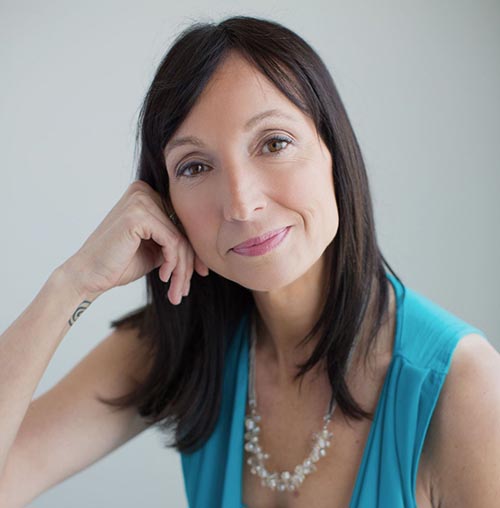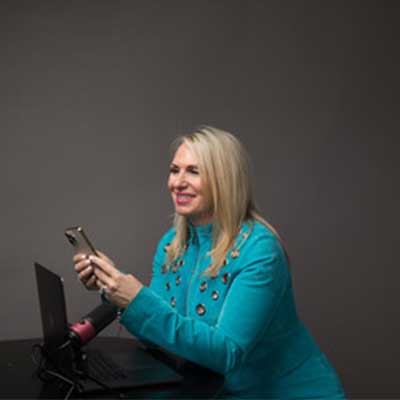What is Generation Z Mirroring Back to Us?
Generation X is what they named my species, and I am proud to say I was part of the first batch. We resisted the Baby Boomer view of the world. Maybe after having been swept up in social justice and anti-war movements, Baby Boomers overcompensated in their zeal for personal achievement and wealth accumulation. Maybe they had a right to focus on themselves for a while. Did it get out of hand? I don’t know. I’m not an expert in that.

What I remember about my own coming of age were two things. The first was feeling excited about possibilities to do things women hadn’t done before. Of course, I had to wear armor to protect myself from the backlash towards independent women that was couched in warped versions of religious doctrine (that’s back in style). But I happily skipped into adulthood and found a career in financial planning (check out those 80s shoulder pads), which was a male-dominated field at the time. Maybe it still is.
The second thing I saw clearly was how the company I worked for exploited men’s desire to be breadwinners for their family by telling them the more hours they worked, the more sales they made, the more profits they generated for the company, that this is what more than anything defined them as successful husbands and fathers. I wondered why they fell for it and why they couldn’t see what was going on. I wondered what their wives thought about it, or their children.
Being a financial planner put my potential income in my hands, so, I worked my ass off to get my business going, and then decided the extra money wasn’t worth being a slave to the company. Instead, I spent those hours being a community activist. It was a perfect balance for me, and other than a couple years later being someone else’s employee, I have always been an entrepreneur. Maybe my entrepreneurial spirit was a mark of Generation X. I’m not sure; like I said, I’m not an expert in such things.
Then came the millennials, they’re between 26-41 right now. I wouldn’t have really noticed them except by the emotionally charged negative remarks about them I constantly overheard. My experience with millennials confirmed they were generally more emotionally aware, technologically advanced, and impatient about wanting to make a difference in the world. I’d be sitting at a bar enjoying a glass of wine and overhear the most heated conversations about this new generation. Those conversations weren’t a debate, rather a kind of misery loves company. I didn’t understand projection at the time, but now I do lol.
https://video.wixstatic.com/video/ed16e5_8de70ac4e52d4232be04165069751cc8/1080p/mp4/file.mp4
“They’re lazy, no work ethic,” was the most common thing I heard from folks who had this self-righteous tone, as if they alone were the final arbiters of what values one ought to prioritize, and what work ethic and lazy meant.
“What do you mean?” I would ask, and then get a response that basically was, “They’re not willing to do what I had to do.” Hmm. So, not being willing to look at the world your way meant they were lazy. Hmm. Not being willing to pledge allegiance to a company that doesn’t really care about you meant they were lazy. Interesting. Prioritizing fulfillment, meaning, experiences, and family meant they were lazy. I didn’t buy it and I wondered why they were so mad.
What kind of projection was going on there? Perhaps beneath the surface of the annoyance and anger towards these younger folks was a realization that they had been duped and exploited by a system that had been a blessing at first and then became something else.
I love millennials, not all of them of course, but I love their desire to not waste time doing meaningless work and wanting to make a difference. “Put them to work is what I would say, unleash their technological prowess and creative thinking.” But ah, that can feel threatening to those who are insecure about their own value. What is this attachment to younger people needing to suffer like you did? Aren’t we supposed to want the next generation to be more innovative, smarter, better than we are, freer to feel purposeful?
Now, are there truly lazy people? Yes, of course! And some of them are Baby Boomers too. But lazy was the label given to a whole generation that simply prioritized different values.
What’s Up with Generation Z?
I share this to put my thoughts about Generation Z folks, who are between 10-25, into context. Generational tendencies don’t come out of nowhere, they are a response and sometimes a strong reaction to the prior generational tendencies and bigger world events, which of course were shaped by the generation before, and further back.

“He’s just so unmotivated,” is how a few loving mothers have described their twenty-year-old sons to me. Genuine worry is how these mothers and fathers feel, not judgment, rather worry about their sons’ and daughters’ wellbeing and futures. Unmotivated is a kinder word than lazy, perhaps a reflection of a more enlightened parenting style used by Generation Xer’s, but it still is looking at the issue through a judgment lens.
Generation Z has the highest rate of anxiety, depression, and other mental health issues. Don’t kid yourself. It’s not about gaming and iPhone screen time. Or maybe the preoccupation with gaming and screentime is a symptom of something else, something so big and consuming, few can see it, like that metaphor of a frog slowly dying as the pot of water goes from simmer to boiling.
Have you ever heard of Indigo children? In the 1980’s, a cross section of professionals, from education to psychology, started identifying a growing number of children who exhibited certain traits like being more connected to nature, a strong intuitive sense, an unusual capacity to make connections and see patterns, and an instinct to rebel against convention. You can learn more about this in the book, The Indigo Children: The New Kids Have Arrived, by Lee Carroll and Jan Tober (1999). The growing number of children with these and other unique traits have largely been misunderstood and overly labeled as having ADD, ADHD, and sensory processing issues, in efforts to force them into education systems that don’t work anymore.
When I learned about autism, my mind immediately wondered whether these children were here to mirror something back to us. I hold the spiritual belief that our children do not belong to us, rather they are put in our hands to care for and prepare to unfold according to their purpose, not ours.
Autistic children are deeply connected to their inner world, sometimes even at the exclusion of being able to engage in the external world. Could it be that rather than force these children to fit into our world, we are to reflect about the need to detach from the external and turn our attention inward?
Could the prevalence of anxiety, depression, paralysis, and lack of motivation among those considered Generation Z be mirroring back to us the need to stop and wonder if we are boiling to death?
The Fight for Wellbeing in an Unwell (Sick) World
James Hillman, the founder of archetypal psychology, wrote a book titled, We’ve Had 100 Years of Psychotherapy, and the World is Getting Worse. He revealed the sinister nature of commercialized therapy, which personalizes mental health problems, making individuals solely responsible for their emotional wellbeing.
Have you noticed there is a dismantling going on right now? Some are purposely working to dismantle unjust patriarchal systems that stopped working long ago and don’t benefit even half of people in our country or even in the world (wealth gap widening, maternal death rates rising, species and eco-systems being destroyed, a tyranny by a minority of corrupt political, corporate, and media interests preventing policies that most Americans want, just to name a few issues).

Others are reacting violently to the dismantling of these systems to maintain power or because those in power have convinced them that progress and more tolerance is bad. There is a disconnect between what most Americans want and what the minority corrupt political and corporate leadership allows. The most common income is $17,000, but few know this because the corporate owned media doesn’t want people to know that fewer people can afford to buy a home, which is the main way the middle class accumulate wealth (through equity). Instead, a growing permanent debtor and renters’ class is emerging, which will solidify control by the top over the bottom. A modern feudal system.
And then we have the whole failing Democracy thing.
And the reversal of tolerance, respect for women, and even specific individual liberties for all sorts of people.
Oh, and the planet might die.
Why would anyone wonder why someone coming of age right now might be anxious or depressed? Or angry? Why would anyone wonder why Generation Z might resist participating in the very unfair systems that have made life worse for most people? If I were twenty right now, I would think the world was fucking nuts. As a mother, I cringe at what’s happening, and I feel sad about the regression we’re suffering through right now. And then I challenge myself and realize I have no right to expect anything from the world. Who do I think I am?
I am rethinking some of my assumptions. I encourage you to do the same. I used to believe that human beings were inherently good. Now, I believe they’re just potentially good or potentially bad, or sometimes one or the other. They are just where they are. I want to quietly support Coaching clients who are seeking to unfold in a way that represents a new kind of consciousness, one that embodies more compassion and innovative thinking driven by new values.
I used to believe in the Myth that the arc of the moral universe is long but that it bends towards justice. I never thought of it as a literal myth, a fairy tale, but a couple of women millennials (,Ana Kasparian of TYT and ,Emma Vigeland of Majority Report) threw cold water on me and woke me up.
Clearly, it is NOT natural to work towards justice, inclusion, equality, and compassion for all. Working towards justice is for the brave, for those who understand the nuance of issues, those who can resist rigid views, those who are willing to stand up to the easy fear-based black and white elixir offered to the masses by those who are power hungry and lazy, not up to the messy and hard work of Democracy and universal human rights.
I get it now. I’m clear headed.
What’s the Deeper Meaning?
Back to the comments by some mothers I have talked with who are watching their young adult children languish emotionally.
I asked one mother what would happen if she switched up the words she was using. “Do they seem paralyzed, as if they’re carrying a burden?” I asked. This seemed to click. Perhaps the burden they are carrying is the desperate need to create new systems that are just–economically, environmentally, socially. We used to be innovative in this country, and now most of the innovation is around superficial consumerism, a tempting bait that if taken provides the permission needed to exploit others.
My young adult children were raised a top twenty percent lifestyle. They lacked nothing, had a private Spanish teacher as young children, started playing sports in middle school, worked part-time in high school for spending money, and are now finishing undergraduate and graduate degrees. They’re expected to take on some student loan debt, and I am grateful that my ex-husband and I were able to save more than a hundred thousand dollars towards their education. It only covered a third of the cost and even we are having to take on significant student loans. And I’ve got my own students loans from going back for a MA/PhD in depth psychology. I don’t know how I’m going to pay them back yet, I just knew I needed to pursue more knowledge to find my place in the world right now.
I describe my children, who are about to turn 24 and 22, as kind and self-reflecting human beings. My son admits he almost turned to the dark and intolerant side, and maybe our constant conversations helped prevent that, along with his desire for knowledge, not easy answers. Now he’s a proud leftist. My daughter will become a therapist specializing in adolescence. She’s already had to accept that in our country, her work is important but not as valued as the work of an accountant. I’ve watched them over the past four years transform in a way that makes me sad, as if they’re coming to terms with a new world order that’s unfolding before their eyes, not a good new world order.

They went from possibilities thinking to what I describe as a desire to just carve out a small space in which they and their LGBTQ+ and friends of color feel safe, hopefully find an enjoyable job, and earn enough money to live a modest lifestyle. They’re confused by violent intolerance and denial of climate change.
Maybe it’s a good thing they’re pulling back, it’s a kind of detachment from the rat race and an acceptance of the current situation. Unjust systems thrive by throwing you a few breadcrumbs that make you feel like you’re better than someone else. Exploiting you as a consumer is a non-violent way to get your permission to screw other people, and even yourself sometimes (breast cancer clusters, for example).
Eckhart Tolle, author of The Power of NOW, says that acceptance is not acceptance of the situation as permanent, rather it is surrendering to the moment so one can think clearly about how to respond to the situation instead of reacting.
This is a time for clear thinking, not reacting, not being triggered. And this is a time for going inward as individuals, because the answer is not outside of us. As those of us who are willing and capable of deep self-reflection go even deeper, to find a new sense of purpose, we make space for those who cannot or will not.
There are millions of us self-reflecting right now, unfolding as new versions of our ourselves, finding new meaning and purpose in service to something bigger and new that eventually will emerge out of the collective unconscious. A new way of living maybe. A transcendent third as C.G. Jung says, something new that results from holding the tension between this and that. This is the deeper meaning of the climax of division, its peaking is a final stand of patriarchal systems, but only if we do the inner work needed to inform right action.
To jump forward in consciousness as a human species requires more and more of us to grow in consciousness and not be dissuaded or distracted by scarcity, fear, anger, despair or the false prophet of hyper consumerism and rigid views.
Anxiety as a Partner
The stopping, the anxiety, depression, could be what is needed to be still enough to create something new. I’ve talked many times about how anxiety is one way our Soul speaks to us.
We tend to want to mold our children to fit into our version of life, maybe because it’s difficult to watch them suffer, or maybe because it reminds us of our own suffering, what we might have unwittingly gave up in exchange for conventional success.
But perhaps there’s something mutual that’s supposed to be going on as we relate with them. Perhaps our children are trying to pull us into their inner world, into their anxious state, to slow us down, to wake us up, to disrupt the manic pattern in which we’re trapped. Maybe as we share their anxiety, we might tap into the promise that resides in the collective unconscious, which so desperately wants to be unleashed into consciousness.
There’s this spiritual advice that whatever is uncomfortable is what needs to be explored. When you’ve been living in a high-achieving rat race, you think it’s normal and righteous. Looking at our young adult children and worrying about them because they don’t seem to have the energy to do anything, could be calling us to do the same, to spend time just being and exploring where anxiety or depression wants to take us.
We can partner with them instead of taking the side of convention.
How to Support Your Gen Z Kid
Are you the parent of a young adult? Do they suffer from anxiety or depression? Or are they angry? Do they talk about it? Do they seem unmotivated, or paralyzed and unable to act? Have you tried to talk with them? How did that go?
Be curious about the deeper meaning of your child’s behavior and emotional state. Wonder about what anxiety wants from your child rather than worry. If you’re lucky enough that your child is open with you, ask them to wonder about the deeper meaning of what they’re feeling.
Take a listen to a video I put together about how to talk to your anxiety. I know it sounds silly, but you probably catch yourself talking to yourself anyway, so it’s kind of the same. You’re just doing it on purpose. Try it alone, as a way to prepare for a conversation with your young adult child, or send the link to them. Maybe they’ll check it out in privacy.
https://video.wixstatic.com/undefined
Encourage them to journal or express through drawing, movement, or music. Once you and your child shift from judging, worrying, and feeling shame to being receptive to new knowledge, the anxiety eventually will transmute into something new, like a new idea, or mindset, or focus. Sitting in whatever they’re feeling is the first step, not resisting it, just sitting with it, and them.
And give them lots of hugs!
Also, be curious about the deeper meaning of whatever it is your child is preoccupied with. When my son was a teenager, he preferred to game. When I listened to the panicky warnings about gaming, I worried about its effect on him. When I got curious about why he enjoyed gaming, I learned so much about him and the parts of his brain that are strong because of gaming. Then I made a deal. I told him if he had some balance, meaning he had to participate in a team sport or activity, get physical exercise, do his homework, and have some family time, he could game as much as he wanted. It worked.
I guess the theme is to be curious instead of worried.
To explore instead of imposing a conventional lens.
Corporate America is panicking – the game is up. That’s why there’s a doubling down on demonizing low-wage workers and other workers who have the audacity to “only want to do the minimum,” and fighting unionizing efforts. Generation Z is resisting exploitation of themselves and others, and the older generation is resentful because they fell for it or they’re willfully ignorant about what it’s like to come of age in today’s world. That’s just my opinion. Remember, I’m not an expert in that stuff, only in the study of the unconscious.
More Resources
If you’re looking for a professional to help your young adult child explore their feelings, I have always been able to relate to those much younger than me. I’m just curious about their thoughts and experiences, I think that’s why. As a reminder, I am not a licensed psychotherapist. I’m between a therapist and a coach, with a PhD in depth psychology, the study of the unconscious. A different and more innovative approach might be what your Gen Z kid needs. Check out my testimonials and schedule a 30 min. FREE consultation. And I’m 100% virtual.

If you’re looking for knowledge about how to think differently about your child’s experience or life in general, check out my podcast, other blog posts, my Soul book, follow me on Instagram for reflection questions, and recordings of conversations with other podcasters that offer good introductions to depth psychology.

NEW on my store are two volumes of 25-page reflection workbooks.
Thanks as always! If you’d like to support my mission to encourage more people to self-reflect, you can become a member or donate to support my efforts in creating all the free content I continuously post.
Until next time . . .
Dr. Deborah
Originally Published on https://www.deborahlukovich.com/blog/




























Already a Member? Login Here.
Not Yet a Member? Join the Conversation Today!